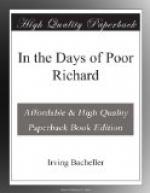“Cat’s blood an’ gunpowder! I thought the smell o’ the jerk would bring ’em,” Solomon whispered. “Say, they’s quite a passel o’ wolves thar—you hear to me. No, I ain’t skeered o’ them thar whelps, but it’s ag’in’ my principles to go to sleep if they’s nuthin’ but air ‘twixt me an’ them. They might be jest fools ’nough to think I were good eatin’; which I ain’t. I guess it’s ‘bout time to take keer o’ this ‘ere jerk an’ start up a fire. I won’t give them loafers nothin’ but hell, if they come ’round here—not a crumb.”
Solomon went to work with his ax in the moonlight, while Jack kindled up the fire.
“We don’t need to tear off our buttons hurryin’,” said the former, as he flung down a dead spruce by the fireside and began chopping it into sticks. “They won’t be lookin’ for more fodder till they’ve picked the bones o’ that ’ere moose. Don’t make it a big fire er you’ll melt our roof. We jest need a little belt o’ blaze eround our front. Our rear is safe. Chain lightnin’ couldn’t slide down this ’ere hill without puttin’ on the brakes.”
Soon they had a good stack of wood inside the fire line and in the pile were some straight young birches. Solomon made stakes of these and drove them deep in the snow close up to the entrance of their refuge, making a stockade with an opening in the middle large enough for a man to pass through. Then they sat down on their blankets, going out often to put wood on the fire. While sitting quietly with their rifles in hand, they observed that the growling and yelping had ceased.
“They’ve got that ’ere moose in their packs,” Solomon whispered. “Now keep yer eye peeled. They’ll be snoopin’ eround here to git our share. You see.”
In half a moment, Jack’s rifle spoke, followed by the loud yelp of a wolf well away from the firelight.
“Uh, huh! You warmed the wax in his ear, that’s sart’in;” said Solomon as Jack was reloading. “Did ye hear him say ’Don’t’?”
The scout’s rifle spoke and another wolf yelped.
“Yer welcome,” Solomon shouted. “I slammed that ‘er hunk o’ lead into the pack leader—a whale of a wolf. The ol’ Cap’n stepped right up clus. Seen ‘im plain—gray, long legged ol’ whelp. He were walkin’ towards the fire when he stubbed his toe. It’s all over now. They’ll snook erway. The army has lost its Gin’ral.”
They saw nothing more of the wolf pack and after an hour or so of watching, they put more wood on the fire, filled the opening in their stockade and lay down to rest. Solomon called it a night of “one-eyed sleep” when they got up at daylight and rekindled the fire and washed their hands and faces in the snow. The two dead wolves lay within fifty feet of the fire and Solomon cut off the tail of the larger one for a souvenir.
They had more steak and bread, moistened with tea, for breakfast and set out again with a good store of jerked meat in their packs. So they proceeded on their journey, as sundry faded clippings inform us, spending their nights thereafter at rude inns or in the cabins of settlers until they had passed the village of the Mohawks, where they found only a few old Indians and their squaws and many dogs and young children. The chief and his sachems and warriors and their wives had gone on to the great council fire in the land of Kiodote, the Thorny Tree.




